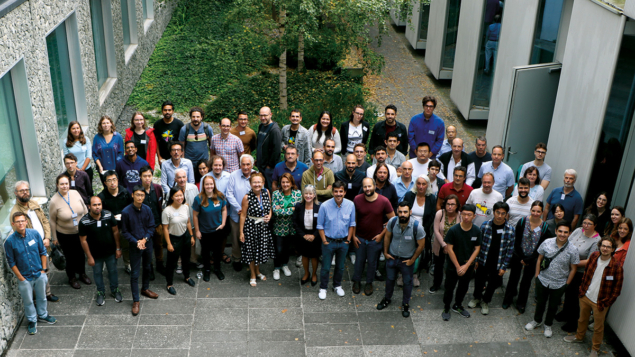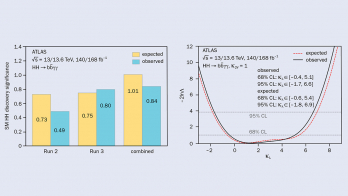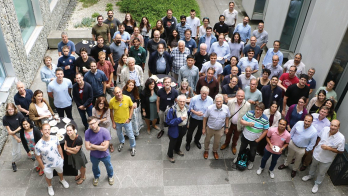Higgs Hunting 2023.

The 13th Higgs Hunting workshop, organised in Orsay and Paris from 11 to 13 September 2023, was a timely opportunity to gather theorists and experimentalists interested in recent results related to the Higgs sector. While the large 140 fb–1 dataset collected by the ATLAS and CMS experiments during LHC Run 2 is still being exploited to measure the Higgs-boson properties in more detail, the first results based on Run 3 data collected since 2022 were also shown, along with searches for phenomena beyond the Standard Model.
Experimental highlights focused on the latest results from CMS and ATLAS. CMS presented a new measurement of the associated production of a Higgs boson with top quarks decaying into b quarks, while ATLAS showed a new measurement of the associated production of a vector boson and a boosted Higgs boson in fully hadronic final states. A major highlight was a new CMS measurement of the Higgs-boson mass in the four-lepton decay channel, reaching the highest precision to date in a single decay channel as well as placing indirect constraints on the Higgs-boson width. Precision measurements were also shown in the framework of effective field theory, which allows potential subtle deviations with respect to the Standard Model to be probed. A small number of intriguing excesses observed, for instance, in the search for partners of the Higgs boson decaying into W-boson or photon pairs were also extensively discussed.
Following a historical talk on the “long and winding road” that led particle physicists from LEP to the discovery of the Higgs boson by Steve Myers, who was CERN director of accelerators and technology when the LHC started up, a dedicated session discussed Higgs-physics prospects at colliders beyond the High-Luminosity LHC (HL-LHC). Patrizia Azzi (INFN Padova) presented the experimental prospects at the proposed Future Circular Collider, and Daniel Schulte (CERN) described the status of muon colliders, highlighting the strong interest within the community and leading to a lively discussion.
The latest theory developments related to Higgs physics were discussed in detail, starting with state-of-the-art predictions for the various Higgs-boson production modes by Aude Gehrmann-De Ridder (ETH Zurich). Andrea Wulzer (CERN) overviewed the theory prospects relevant for future collider projects, while Raffaele Tito D’Agnolo (IPhT, Saclay) presented the connections between the properties of the Higgs boson and cosmology and Arttu Rajantie (Imperial College) focused on implications of the Higgs vacuum metastability on new physics. Finally, a “vision” talk by Matthew McCullough (CERN) questioned our common assumption that the Higgs boson discovered at the LHC is really compatible with Standard Model expectations, considering the current precision of the measurements of its properties.
During several experimental sessions, recent results covering a wide range of topics were presented – in particular those related to vector-boson scattering, since their high-energy behaviour is driven by the properties of the Higgs boson. The Higgs-boson self-coupling was another topic of interest. The best precision on this measurement is currently achieved by combining indirect constraints from processes involving a single Higgs boson together with direct searches for the rare production of a Higgs-boson pair. While the Run 3 data set will provide an opportunity to further improve the sensitivity to the latter, its observation is expected to take place towards the end of HL-LHC operations. Finally, Stéphanie Roccia (LPSC) presented the implications of experimental measurements of the neutron electron dipole moment on the CP-violating couplings of the Higgs boson to fermions, absent in the Standard Model. Concluding talks were given by Massimiliano Grazzini (University of Zurich) and Andrea Rizzi (University and INFN Pisa). The next Higgs Hunting workshop will be held in Orsay and Paris from 23 to 25 September 2024.







